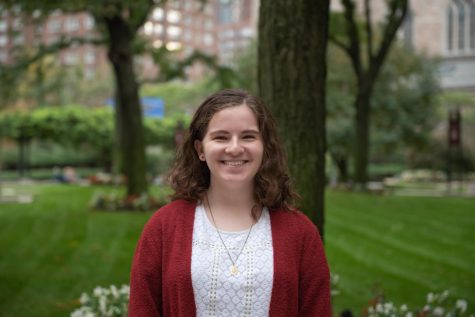Fordham Institutes Classics Requirement
Every student will have to take classes in Latin, Ancient Greek and Aramaic
April 1, 2022
As a Jesuit institution, Fordham is well-known for its longstanding tradition of upholding many Christian values and remaining faithful to all the most conservative Catholic traditions like making students only speak Latin and wear priests’ collars. With the first non-Jesuit president taking the helm of the school in July comes a new core requirement: classical languages.
Fordham, especially the Lincoln Center campus, is renowned for its religiosity and faithfulness to the Jesuit tenets. Each week, the elevators flood with people as every undergraduate, graduate, and law student attends Mass in the chapel on the third floor of Lowenstein.
As a student at Rose Hill, Cornelia Romanus, Fordham College at Rose Hill ’23, makes the trek from her home campus in the Bronx every Sunday. “I didn’t even know Rose Hill had a church,” she said. “What’s the use of a ‘university church’ when there’s a chapel on the third floor of an office building?”
Getting the full experience of Mass at Lincoln Center of course means using the Latin prayers, as well. “For me, there’s no other language I’d want to hear the word of God in,” Romanus said.
Laura Auricchio, dean of Fordham College at Lincoln Center (FCLC), said the deans felt that requiring Latin and Ancient Greek classical languages made sense for Fordham students. She emphasized that they are also excited to add a bonus language, Aramaic, the language of Jesus, to this requirement.
The deans have been discussing recent changes to the core curriculum, and this change to the core was agreed on unanimously by all Rose Hill and Lincoln Center deans.
Students and faculty have all been asking current University President Rev. Joseph M. McShane, S.J., for this change for years, but only President-elect Tania Tetlow can bring what the students truly want.
“I came to Fordham to get a Jesuit education,” Aileigh Antiqua, FCLC ’25, said. “The first thing I expected was Latin and Greek — in fact, I was surprised this is a recent change. I’m excited for the new president to take her place!”
Publius Crito, a classics lecturer, said that this shift will also help bolster Fordham’s classics department, which has only been growing in the past few decades. The courses are always full of students eager to learn useful phrases such as “bellum gerere” (“to wage war”) and “Carthago delenda est” (“Carthage must be destroyed”), according to Crito.
Many students said that they did not know that “cura personalis” actually means “care that all students become fluent in Latin”
“We want students to study only the most useful languages that will surely help them in their daily lives,” Crito said. “Who wouldn’t use the Greek particles ‘mén’ and ‘de’ in everyday speech?”
Students already involved in the classics department similarly expressed their support.
“After a decade of Latin and Greek, I still don’t know how to say ‘Where is the bathroom?’ but I know many words for death off the top of my head,” W.M. Frederick Petersworth, FCLC ’74, said. “The school’s classical languages requirement will fix this discrepancy.”
Hebrew is also an option for students who would like to go the extra mile.
Others expressed that having a classics requirement would help students understand Fordham’s Jesuit tenets. Many students said that they did not know that “cura personalis” actually means “care that all students become fluent in Latin” and that “AMDG” stands for “All men dictate in Greek.”
The Rev. Vincent DeCola, S.J., dean of Gabelli School of Business at Lincoln Center, also expressed his support for this change.
“How can Gabelli students successfully run businesses if they don’t know how to kick out the moneychangers from the temple — in the Aramaic that Jesus spoke?” he asked.
Students are still permitted to take other languages like Spanish, German, or Mandarin, but these will only be taken in addition to the required four semesters each of Latin and Greek and two semesters of Aramaic.
Hebrew is also an option for students who would like to go the extra mile.
The Observer was unable to contact Fordham’s first presidents or Julius Caesar himself for comment, though we are sure that they would only have laudatory words for the school’s decision.

















